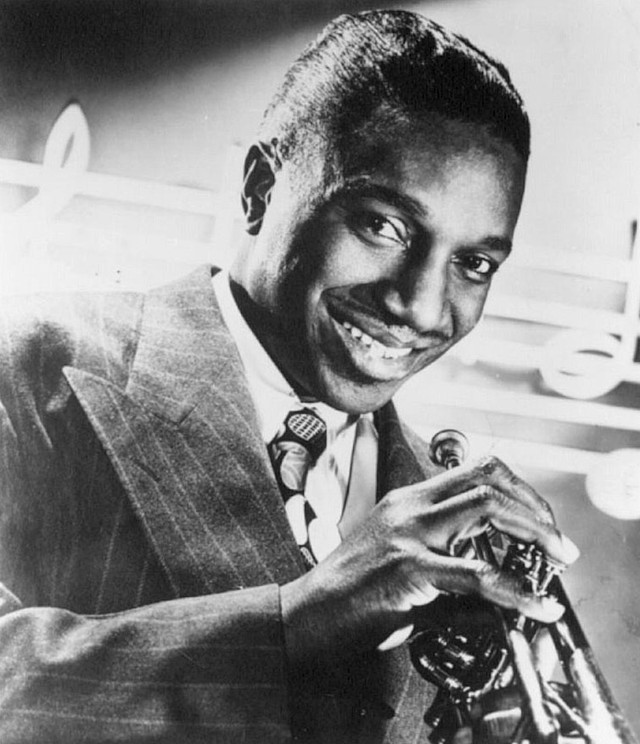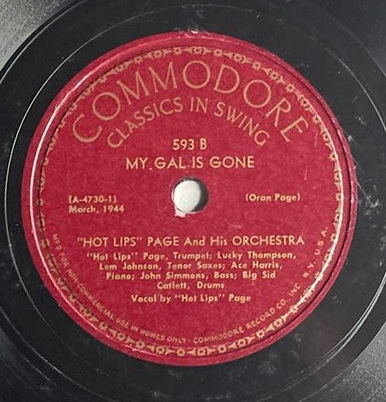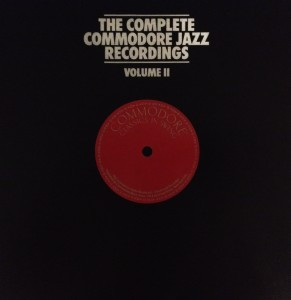My Gal Is Gone – Oran "Hot Lips" Page
The essential Hot Lips Page, here in a medium-tempo blues setting. Like the other songs with vocals from this session, this one has no lead sheet; melody transcriptions are available for Page's trumpet and vocals on both takes, as well as a transcription of Lucky Thompson's tenor sax solo on the alternate take.
- Recording: Hot Lips Page - Commodore 593B
- Recorded on: March 8, 1944
- Label: Commodore (593B)
- Concert Key: B-flat
- Vocal Range: Tenor, B-flat3 to F4 written 8va
- Style: Swing (medium)
- Trumpet, Vocal - Hot Lips Page
- Tenor Sax - Lucky Thompson, Lem Johnson
- Piano - Ace Harris
- Bass - John Simmons
- Drums - Sid Catlett
Video
- Description
- Historical Notes
- Solos
- Piano Corner
- Bass Corner
- Drum Corner
- Guitar Corner
- Inside & Beyond
- Minus You
Nothing but the blues! Our trumpet and vocal transcriptions of Hot Lips Page are a great opportunity to explore his signature blues style. These transcriptions are available for both master and alternate takes for an in-depth look at Page's improvising and melodic interpretation.
After a four-measure piano intro, Page plays a cup-muted trumpet solo chorus. He then sings four choruses; the last of these starts with four measures of stop-time. Tenor saxophonist Lucky Thompson solos for one chorus, and then Page comes back for a final open trumpet chorus. Our audio excerpts for both takes begin with the vocal, after the opening trumpet solo.
Click on Solos for more details about the trumpet transcription. It's important to remember that these transcriptions, especially the vocal, are only accurate up to a certain point; you must listen to the recording to get a sense of the subtle push and pull of the phrasing that can't be captured in notation.
Lyric description: All the great blues singers have railroad songs, and My Gal Is Gone is an iconic example. Page really paints a scene here—calling on the whole crew to stop the train that has taken his love away.
Click on the second album cover for the alternate take.
After a four-measure piano intro, Page plays a cup-muted trumpet solo chorus. He then sings four choruses; the last of these starts with four measures of stop-time. Tenor saxophonist Lucky Thompson solos for one chorus, and then Page comes back for a final open trumpet chorus. Our audio excerpts for both takes begin with the vocal, after the opening trumpet solo.
Click on Solos for more details about the trumpet transcription. It's important to remember that these transcriptions, especially the vocal, are only accurate up to a certain point; you must listen to the recording to get a sense of the subtle push and pull of the phrasing that can't be captured in notation.
Lyric description: All the great blues singers have railroad songs, and My Gal Is Gone is an iconic example. Page really paints a scene here—calling on the whole crew to stop the train that has taken his love away.
Click on the second album cover for the alternate take.
On the same day as this session, Hot Lips Page also recorded for V-Disc (a label intended for military release) as part of an all-star octet led by guitarist Eddie Condon. The three songs issued from this session include the first recording of Page's hit Uncle Sam's Blues (also known as Uncle Sam Ain't No Woman). Several live recordings by Condon around this time, as well as another V-Disc later in 1944, feature Page alongside fellow trumpeter Bobby Hackett.
The pianist on this session, Ace Harris, led his own big band in the '30s. By 1944 he was playing in trumpeter Erskine Hawkins' big band. Harris made a few small group recordings as a leader in the mid- to late '40s; the lineups of these are mostly unknown but they include tenor saxophonist Eddie "Lockjaw" Davis.
The pianist on this session, Ace Harris, led his own big band in the '30s. By 1944 he was playing in trumpeter Erskine Hawkins' big band. Harris made a few small group recordings as a leader in the mid- to late '40s; the lineups of these are mostly unknown but they include tenor saxophonist Eddie "Lockjaw" Davis.
Our Hot Lips Page trumpet transcription includes both his muted first chorus before the vocal CLIP and his open chorus at the end [NEW CLIP!]. In both takes, Page plays with a bouncy triplet feel in his opening muted chorus. His last chorus on the master take is full of double-time lines in a style reminiscent of Louis Armstrong. Click on the second album cover to compare with his solo on the alternate take.
Related Songs
Email Send My Gal Is Gone to a friend
Send this page to a friend via email. Add your name or email in the first field. In the second, add one or more email addresses, separated by a comma.
- Recording: Oran "Hot Lips" Page - Complete Commodore Jazz Recordings, Vol. II
- Recorded on: March 8, 1944
- Label: Mosaic (MD23-128)
- Concert Key: B-flat
- Vocal Range: Tenor, B-flat3 to F4 written 8va
- Style: Swing (medium)
- Trumpet, Vocal - Hot Lips Page
- Tenor Sax - Lucky Thompson, Lem Johnson
- Piano - Ace Harris
- Bass - John Simmons
- Drums - Sid Catlett
Video
- Description
- Historical Notes
- Solos
- Piano Corner
- Bass Corner
- Drum Corner
- Guitar Corner
- Inside & Beyond
- Minus You
This alternate take was recorded after the master take; the tempo is a little slower, but the stop-time in the last vocal chorus is tighter. Hot Lips Page trumpet and vocal transcriptions are available for this one as well as the master; click on Solos for the trumpet transcription.
The vocal transcription may look very similar to the master take, with a few different words and rhythms here and there. Once again, listen to the recording for the subtle distinctions in intonation and phrasing throughout.
A transcription is available for Lucky Thompson's tenor sax solo; click on Solos for more details.
The vocal transcription may look very similar to the master take, with a few different words and rhythms here and there. Once again, listen to the recording for the subtle distinctions in intonation and phrasing throughout.
A transcription is available for Lucky Thompson's tenor sax solo; click on Solos for more details.
This session was one of two Hot Lips Page recordings with bassist John Simmons. In his book "Jazz Anecdotes," Bill Crow tells a great story about Simmons and Page:
"When bassist John Simmons was twelve years old and living in Tulsa, Oklahoma, he spent an afternoon at Barry's Park, where Hot Lips Page was playing with Benny Morton's band:
"A lady came to the door and called me over. "Little boy, would you give this note to Lips Page?" I took the note up to the bandstand and announced, "Lady there at the door sent this letter to Mr. Warm Jaws." Everybody in the band fell out in hysterics, and Lips got mad."
Years later John found himself on a New York bandstand with Lips. At the end of a number, John leaned across his bass and asked Page: "What note was that, Mr. Warm Jaws?" Lips whirled around and said, "I'll knock you down! I've only been called that once in my life!"
John shouted "That was me!"
"When bassist John Simmons was twelve years old and living in Tulsa, Oklahoma, he spent an afternoon at Barry's Park, where Hot Lips Page was playing with Benny Morton's band:
"A lady came to the door and called me over. "Little boy, would you give this note to Lips Page?" I took the note up to the bandstand and announced, "Lady there at the door sent this letter to Mr. Warm Jaws." Everybody in the band fell out in hysterics, and Lips got mad."
Years later John found himself on a New York bandstand with Lips. At the end of a number, John leaned across his bass and asked Page: "What note was that, Mr. Warm Jaws?" Lips whirled around and said, "I'll knock you down! I've only been called that once in my life!"
John shouted "That was me!"
As with the master take, a trumpet transcription is available including Hot Lips Page's muted chorus at the beginning CLIP and open chorus at the end [NEW CLIP!]. His lines are quite a bit different from the master take; our transcriptions are a great opportunity to compare and contrast these back-to-back takes. Like the earlier master, his muted chorus on the alternate is bouncy with a triplet feel. The final chorus is more personal, with less of an obvious Louis Armstrong influence; there are fewer double-time rhythmic figures in this version.
CLIP A transcription is available for Lucky Thompson's tenor sax solo from this alternate take. It's an elaborate, virtuosic solo— almost like what Art Tatum would sound like on tenor! Or even Thelonious Monk, as suggested by the whole-tone scales that make up his fastest runs. The warm, smooth tone through all his melodic complexity is quintessential Lucky, even at this early point in his career. The tremolo in the second measure is an embouchure "shake" rather than a fingered trill.
CLIP A transcription is available for Lucky Thompson's tenor sax solo from this alternate take. It's an elaborate, virtuosic solo— almost like what Art Tatum would sound like on tenor! Or even Thelonious Monk, as suggested by the whole-tone scales that make up his fastest runs. The warm, smooth tone through all his melodic complexity is quintessential Lucky, even at this early point in his career. The tremolo in the second measure is an embouchure "shake" rather than a fingered trill.
Related Songs
Email Send My Gal Is Gone to a friend
Send this page to a friend via email. Add your name or email in the first field. In the second, add one or more email addresses, separated by a comma.

Oran "Hot Lips" Page
January 27, 1908 – November 5, 1954
Oran “Hot Lips” Page is remembered as one of the most exciting soloists of the swing era. His trumpet and vocal styles were both strongly influenced by Louis Armstrong, but with plenty of his own personal flair. He is particularly associated with the Kansas City scene of the early to mid-1930s. Read more...
There was a problem.
...


